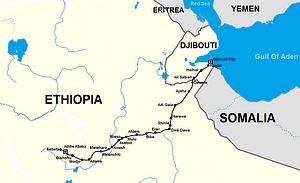On July 11, China officially dispatched military personnel to set up its first-ever overseas base in Djibouti, the small country in East Africa.
While foreign media call the new facility a “military” base, China instead calls it a “support base,” which “will ensure China’s performance of missions, such as escorting, peace-keeping, and humanitarian aid in Africa and west Asia,” according to Xinhua, China’s news agency.
In the early morning of July 11, China held an official ceremony in the port of Zhanjiang, south China’s Guangdong province. The commander of China’s People’s Liberation Army Navy (PLAN), Shen Jinlong, “read an order on constructing the base in Djibouti, and conferred military flag on the fleets.” Then Shen ordered, “Set off!” and the ships carrying Chinese military personnel departed the port, reported Xinhua.
In addition to its basic supporting role, the Djibouti base will also perform other functions including “military cooperation, joint exercises, evacuating and protecting overseas Chinese and emergency rescue, as well as jointly maintaining security of international strategic seaways,” said Xinhua.
Regarding China’s reasons for establishing the “support base,” Chinese Foreign Minister Wang Yi explained that it is meant to help “maintain [China’s] growing overseas interests.”
In an annual press conference held during the 12th National People’s Congress held on March 8, 2016, Wang Yi elaborated on China’s construction in Djibouti:
Like any growing powers, China’s interests are constantly expanding overseas. At present, there are 30,000 Chinese enterprises all over the world… An urgent task for China’s diplomacy is to maintain the growing overseas interests. How to maintain? I would like to tell you clearly that China will never go through the expansion path of the traditional powers, nor will China pursue hegemony. We want to explore a path with Chinese characteristics that both follows the trend of the times and is welcomed by all parties.
Thus, “according to the objective needs and in response to the wishes of the related country,” China will establish some necessary facilities, like its support base in Djibouti. “This is not only reasonable, but also in line with international practice,” said Wang Yi.
So far, it seems that the “related country” — Djibouti — does wish for a greater Chinese presence. China has greatly invested in the tiny Horn of African nation, and included Djibouti in its grand “One Belt, One Road” initiative.
According to Aboubaker Omar Hadi, the chairman of Djibouti Ports and Free Zones Authority, China has already invested nearly $15 billion in Djibouti’s port expansion and related infrastructure development.
Charlotte Gao holds a MA degree in Asian Studies. Her research interests center around East Asian topics. She has worked in the past as a news editor, reporter, and writer for multiple traditional, online, and new media outlets.

































